The Best Gumroad Alternatives For 2024 (Comparison)

Looking for an alternative to Gumroad? We’ve got you covered.
While Gumroad is a good ecommerce platform for those wanting to sell digital products, it has a number of issues that some users may not be able to get past.
It’s low barrier to entry has resulted in support issues. And new customers are charged 10% in fees in order to use the platform.
In this post, we’re comparing the best Gumroad alternatives. We’re letting you know what features make them worth considering over Gumroad along with their pricing.
By the end of this post, you’ll know exactly which ecommerce platform you should consider using in your business.
The best Gumroad alternatives — Summary
TL;DR:
- Sellfy — The best Gumroad alternative overall. Sell digital downloads, physical products, on demand video, print on demand merch, and more.
- Payhip — Simple alternative to Gumroad for selling digital products and memberships.
- Lemon Squeezy — Great alternative to Gumroad. Simple but powerful. Perfect for selling software thanks to its license key generation feature.
- SendOwl — Great platform for selling digital downloads and streams. Includes security features such as document watermarking. You can expire download links based on number of downloads or expiry date.
- Podia — The best platform for selling courses and webinars.
- DPD — Best suited for selling ebooks.
- Shopify — The best alternative to Gumroad for those who need to create a full-featured ecommerce site.
- Squarespace Ecommerce — The best option for those who need a website builder with ecommerce functionality.
- BigCommerce — Ideal for creating larger online stores.
Let’s talk about what makes each of these platforms special.
1. Sellfy
Sellfy is more than just a simple ecommerce platform for selling digital and physical products. It’s special because it comes with a print-on-demand service.
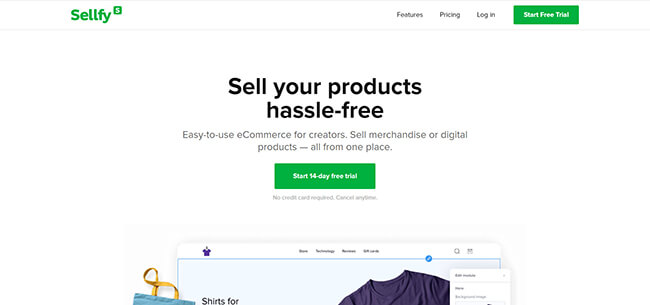
That means you can sell your designs and have customers print them on shirts, hoodies, mugs, and other products. Sellfy will take care of the printing and shipping on your behalf so you can focus on other aspects of your business.
You can also sell subscriptions which are ideal for online courses, tutorials, and other membership programs and charge customers weekly, monthly, or yearly.
Sellfy also offers on-demand video streaming. And if you’re worried about people resharing your videos with non-paying folks, don’t be. It has security measures in place that’ll prevent that from happening.
This platform has an easy-to-use website builder. So even if you don’t know how to code, you will be able to design your own website from scratch. You can move elements around, add text, change colors, and insert images. You can also connect your domain for a more consistent branding.
There’s even a feature that automatically translates your pages into another language. This is helpful for users who are non-native English speakers.
All landing pages will load correctly when viewed from a mobile device.
Sellfy comes with marketing features that’ll help you promote your products. For instance, you can create discount codes to encourage people to buy more from you. You can also start an email marketing campaign and send newsletters to your leads. Sellfy has a feature that lets you add tracking pixels on your Facebook and Twitter ads.
One of the best things about Sellfy is that you can embed your online store on any site. Say you have a blog, you can add product cards there so that you can monetize your content.
Pricing: Starter (starts at $19/month billed bi-annually), Business (starts at $49/month billed bi-annually), Premium (starts at $99/month billed bi-annually).
Sellfy offers a 30-day money back guarantee.
Read our Sellfy review.
2. Payhip
Payhip is a great platform if you want a seamless checkout process for your customers. It specializes in increasing your digital product sales and completing transactions as quickly as possible.
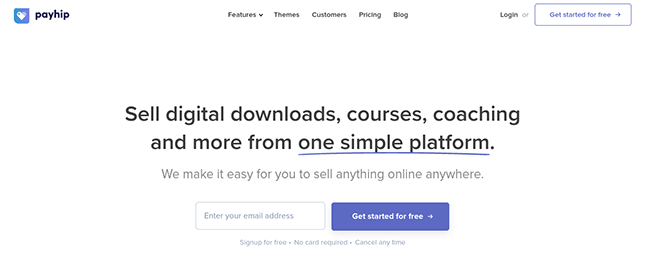
Not only is the checkout page pretty, but it’s also quite responsive as well. That means it’ll be a great experience for users regardless of whether they’re using a desktop, laptop, tablet, or smartphone.
Even better, Payhip lets you add a checkout option to whatever platform you’re using. You can add a checkout to your social media pages, blog, or from your website. Payhip claims to have optimized its checkout to increase conversions. That’s why your customers will be able to complete a transaction in seconds.
After every purchase, customers can download your product files straight away. But if they miss it for any reason, they can still access the digital product through a download link that Payhip will email them.
Customers can pay using PayPal or any major credit card.
Other features that you might like include an affiliate system wherein you can ask other users to find you new customers, an option to offer coupons, and social discounts that give your followers discounts for tweets and likes.
Payhip also has a pay-what-you-want pricing model which lets your customers decide how much they think your products are worth.
You can also create mailing lists to keep in touch with your customers and inform them if there are ongoing promotions or new products dropping.
To make sure that customers don’t abuse their download privileges, Payhip puts a limit on how many times a user can download your product. There’s also PDF stamping available so they can’t share your products illegally.
There are no storage limits so you can upload as many products as you want. But there is a file limit — meaning you can’t upload a file that’s more than 5 GB in size.
Pricing: Free (5% transaction fee), Plus ($29/month + 2% transaction fee), Pro ($99/month)
Read our Payhip review.
3. Lemon Squeezy
Lemon Squeezy is just about as simple as an ecommerce can get. It gives you all the necessary tools to sell your digital products.
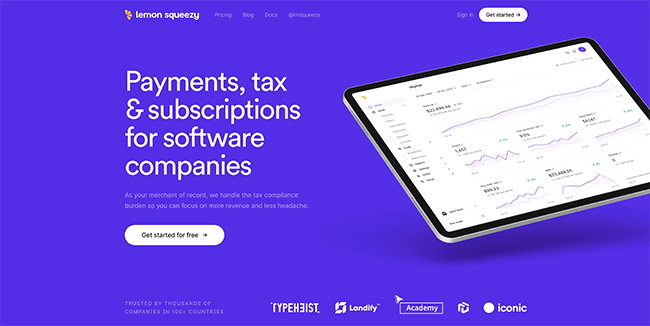
You can create an online store in just minutes without having to write a line of code. All sites created through Lemon Squeezy are SSL-secured and will have no problem loading on mobile devices.
This platform also lets you sell your products from anywhere. You can embed the checkout overlay or share your checkout link with potential customers.
As with other platforms, you will be able to start selling courses, ebooks, videos, audio files, design assets, and other digital downloads. You can even sell subscriptions. But did you know that Lemon Squeezy also allows you to sell software?
That’s right. If you are in the software or app business, Lemon Squeezy can help you. It can manage customer access by issuing license keys with each sale. That will limit your software users to just those who paid for it.
Lemon Squeezy comes with marketing tools too. You can launch an email marketing campaign to help you better connect with your audience. If you think your products work better as a bundle, you can do that.
Another great addition is its pay-what-you-want payment structure where users can decide how much they pay you for your product. This model is slowly gaining traction and could be the way to go for some creators. And if that doesn’t work, you can always offer discount codes to generate some buzz.
Lemon Squeezy has built-in analytics that’ll show you how well your online business is performing. And you can generate invoices for your customers. The company will even handle tax compliance for you.
Pricing: No monthly charge, instead they charge a transaction fee of 5% +50¢ per sale.
4. SendOwl
SendOwl not only lets you sell your products, but it also has a brand new feature that helps creators start sponsorships. For the unfamiliar, sponsorships are a way for your audience to contribute to you directly for your work. But unlike other sponsorship platforms like Patreon, SendOwl won’t take a cut of your profits.
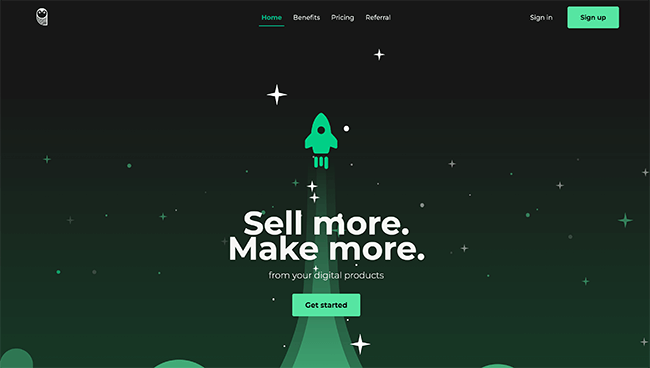
So if you’re a YouTube creator, for example, then you can start a sponsorship program as well as sell products related to your brand from one platform. That makes it all the more convenient.
It has all the features you’d expect from an ecommerce site. It can integrate with several apps including Shopify, Stripe, Apple Pay, PayPal, Google Analytics, and MailChimp for added functionality. It has a modern, responsive checkout system. And it supports multiple languages and currencies.
You can sell physical and digital products through the platform. You can also create memberships and subscriptions. If needed, you can create license keys for your software offerings.
As far as marketing is concerned, you have discounts and promo codes. An affiliate program is also available. Plans include 1-click upsells and the ability to manage abandoned carts. SendOwl has a pay-what-you-want pricing plan.
SendOwl also lets you customize the checkout fields to contain the information you need such as your customer’s VAT information. You can also customize it through HTML, CSS, and JavaScript. There are three checkout templates to choose from.
As a precaution, SendOwl limits the number of downloads that a customer makes. There is also a time limit for accessing download links. As for your account, there is 2-factor authentication so only you can get into your account.
The analytics section will give you data as to how well your store is performing. This is also where you’ll find information about the orders you’re getting and the people who buy them.
There are three sets of pricing plans available on SendOwl. The prices below are for the Standard set.
Pricing: Standard ($15/month), Premium ($24/month), Business ($39/month), Custom
5. Podia
Podia is one of the best platforms for promoting selling digital products. You can sell courses, webinars, ebooks, and even create paid communities.

This platform lets you build a mobile-friendly website that you can customize to fit your needs. You can add your own domain or a Podia subdomain if you don’t have one. There are email marketing features that make it possible to promote your brand and products to everyone on your email list.
And if your site visitors have questions, they can interact with you through the live chat widget.
There’s also an affiliate marketing feature that can convert your followers into your very own sales force. This will be important for people who’d want to get more sales without spending a ton on marketing.
One of the great things about Podia is that it offers 24/7 support. So if you run into any issue while working on a project, you can get in touch with the company. If that’s not an option for you, Podia does offer a lot of resources like guides, articles, videos, tools, and webinars.
Speaking of webinars, you too can start your own webinar in just a couple of minutes. All you need to do is to connect your YouTube Live or Zoom account. Once that’s set up, you can charge people to access your webinars or livestreams.
Your earnings don’t stop there either. Users will still be able to access your recordings long after you’re done with the broadcast. So you will earn money from replays. You can also bundle a webinar with your other products like online courses or other digital products.
Podia is a strong contender in our list of Gumroad alternatives because there are no transaction fees here.
Pricing: Mover ($39/month), Shaker ($89/month), Earthquaker ($199/month).
Free plan available with transaction fees.
Read our Podia review.
6. DPD
DPD lets people sell their ebooks along with other digital products like software, music, audio files, and graphic resources. It makes our list because this ecommerce platform is built for people who have little to no experience with selling online.
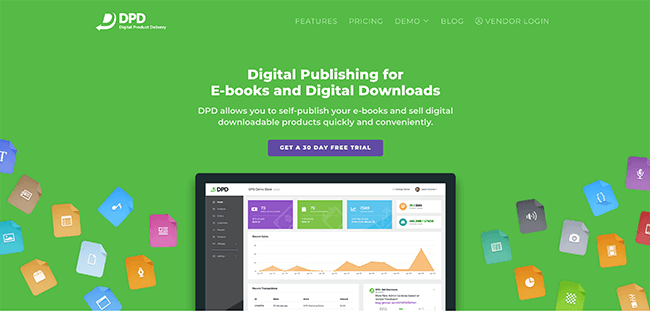
You don’t need to know how to code. Everything’s point-and-click.
But that doesn’t mean that DPD lacks features. On the contrary, DPD has advanced features that any entrepreneur would need to sell online.
Any site created through DPD is PCI-DSS compliant. That means it uses SSL for all checkouts and that it doesn’t store customer data.
You will also be able to manage multiple online stores with your one account. This allows you to sell through multiple sites and only need a single dashboard to monitor all of your online store activity.
DPD doesn’t take a cut of your sales. And it can hold any product no matter how big the file size is. It offers PDF stamping, a feature that displays the buyer’s info on the ebook they bought. This will discourage buyers from resharing your content.
If you make updates to your product files, DPD will automatically send a unique download link to previous customers so that they’ll receive the most recent version. You can keep track of your sales and other ecommerce data with the use of DPD’s Google Analytics integration.
Other features worth mentioning include DPD’s full-featured shopping cart, multi-language checkout, customizable email templates, coupons/discount codes, built-in tax calculations, sale notifications, and sub-users for your customer service staff.
Pricing: 20 Products ($10/month), 35 Products ($16/month), 120 Products ($30/month), Custom
7. Shopify
Shopify needs no introduction for people who’ve researched ecommerce platforms before. It’s one of the most recognized brands in this space. It’s not just designed for selling digital products. You can also use it to sell physical products and more.

There are plenty of things to like about Shopify. It has services that go beyond your average Gumroad alternative. For example, you can use Shopify to generate a business name and create a free logo. You can also download free stock photos that you could use on your website.
You can use Shopify to get a custom domain for your site. And if you’re not sure what you want to sell, you’ll be happy to hear that Shopify has partnered with Oberlo. That means you can use Oberlo to find items to sell and have the company ship them directly to your customers.
There are a ton of resources available to guide you through the setup process including blog posts, guides, and podcasts.
Shopify’s drag-and-drop store builder makes sure that even those who don’t have any experience building a website can do so in just a few minutes. All pages are mobile-friendly. And thanks to Shopify Payments, all transactions are quick and secure.
There is a mobile app that allows you to track your progress even while you’re on the go.
The included analytics feature gives you insight as to how your business is going. And there are SEO features that you can use to optimize your website for search engines.
To market your brand, you can start a blog or launch an email marketing campaign. You can also use Shopify to choose an audience to target through Facebook Ads.
Shopify has 24/7 customer support which means you can get in touch with the Shopify team whenever you need to.
Pricing: Starter ($5/month), Basic ($39/month), Shopify ($105/month), Advanced ($399/month). Save 25% if an annual subscription is purchased. Get started with a 3-day free trial, then $1/month after for 3 months.
8. Squarespace Ecommerce
Squarespace is widely known for having the most beautiful templates to work with. Their designs are mostly minimalistic and modern. The best part is that they’re all easy to work with — meaning you can update the designs by clicking-and-dragging elements around.
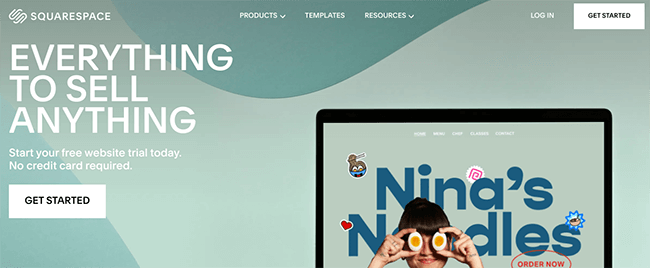
It’s not that hard to come up with a design that truly matches your branding. You’re bound to find a template that will work with your niche. There are just so many templates to choose from.
Squarespace is also designed to work with ecommerce businesses. Its features make it so simple to showcase your products.
If you’re in the service industry, there are tools here that can really help you outshine your competitors. For example, the built-in booking system allows your customers to set up appointments. You can also embed maps to your site so your customers know where to go if your store has physical locations.
People go to Squarespace to start selling online courses, subscriptions, and other digital products. You can even use it to sell in person.
There are flexible payment options and an automatic tax calculator. You can collect customer emails to build a mailing list. Squarespace works with Apple Pay, PayPal, FedEx, Printful, Xero, and other third-party tools.
Squarespace does have most of the features you’ll need to finally get that business of yours up and running. Starting an online shop has never been this easy.
Pricing: Personal ($12/month billed annually), Business ($18/month billed annually), Basic Commerce ($26/month billed annually), Advanced Commerce ($40/month billed annually)
9. BigCommerce
BigCommerce is another popular ecommerce store builder that can cater to a variety of different product types. It’s best suited to larger stores and enterprise companies.
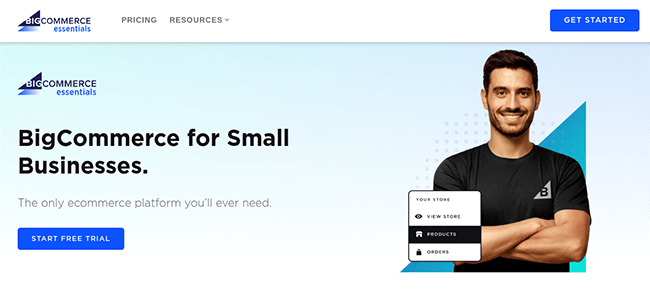
Let’s start with the Page Builder. This tool lets you customize your site without the need for coding unless you want to. You can also choose from the free or premium templates to have a starting point. The best part about all of this is that there is a live preview mode. So you can see what your site will look like even before you hit Publish.
This platform promises that your site will load quickly and provide you with unparalleled bandwidth with multiple layers of security.
Managing your online store is far from complicated. Your inventory is streamlined which means even if you sell through different channels simultaneously, BigCommerce can keep track of your products. You’ll even get sent low-stock alerts so you’ll know when you’re running out of certain items.
BigCommerce is also able to accept payments through different gateways including digital wallets. There’s protection against fraud and chargebacks. If there’s a need for recurring payments, this platform has solutions for that as well.
You can optimize your site for search engines. There is a feature to segment your customers for a more precise message targeting. You can use the abandoned cart saver feature to send follow-up emails to customers who left their orders before checkout. And you can start a blog to promote your products and services.
BigCommerce has a mobile app that allows you to track your progress through a mobile device. You can also view and update orders through the app.
Pricing: Plans start from $39/month (save 25% with an annual subscription). 15-day free trial available.
Final thoughts
And that concludes our comparison of Gumroad alternatives. From simple but powerful platforms for selling digital products to fully fledged ecommerce platforms – there’s something on this list for everyone.
But which platform should you choose? That depends exactly on your needs and the types of products you want to sell.
Consider your budget, current business needs, and what your business may need in the future. It’s always easier to grow your business if you don’t need to be concerned about switching platforms later.
For example, would you want to sell physical products or print-on-demand products in the future? Platforms like Sellfy support both of these product types but other platforms may require you to sign up with a third-party provider such as Printful to facilitate print-on-demand products.
Ultimately, you can’t go wrong with any of the options on this list. Most of them offer free trials. So, scroll back up the post and use the buttons above to visit the website of the platform you want to try. Then activate your free trial and see how well the platform fits with your needs.
Disclosure: Our content is reader-supported. If you click on certain links we may make a commission.
